A Research Proposal on Treatment of ADHD in School-Aged Children
VerifiedAdded on 2023/06/09
|8
|1915
|189
Report
AI Summary
This research proposal explores the application of school-based treatments for school-age children with Attention Deficit Hyperactivity Disorder (ADHD), a common neurological disorder affecting children's development. It addresses the potential benefits of providing Individualized Educational Programs (IEPs) and psychosocial interventions within school settings to manage ADHD and promote inclusion and confidence among students. The proposal investigates the effectiveness of school-based interventions, potentially combined with occupational therapy, in enhancing attention, learning abilities, and daily life skills. It also acknowledges the challenges associated with implementing such interventions, including the need for trained personnel and resources, while emphasizing the growing support for integrating treatment with educational strategies in schools. The research methodology is based on a study involving mindfulness training and parental involvement, aiming to assess the impact of these interventions on children's ADHD symptoms and overall well-being.
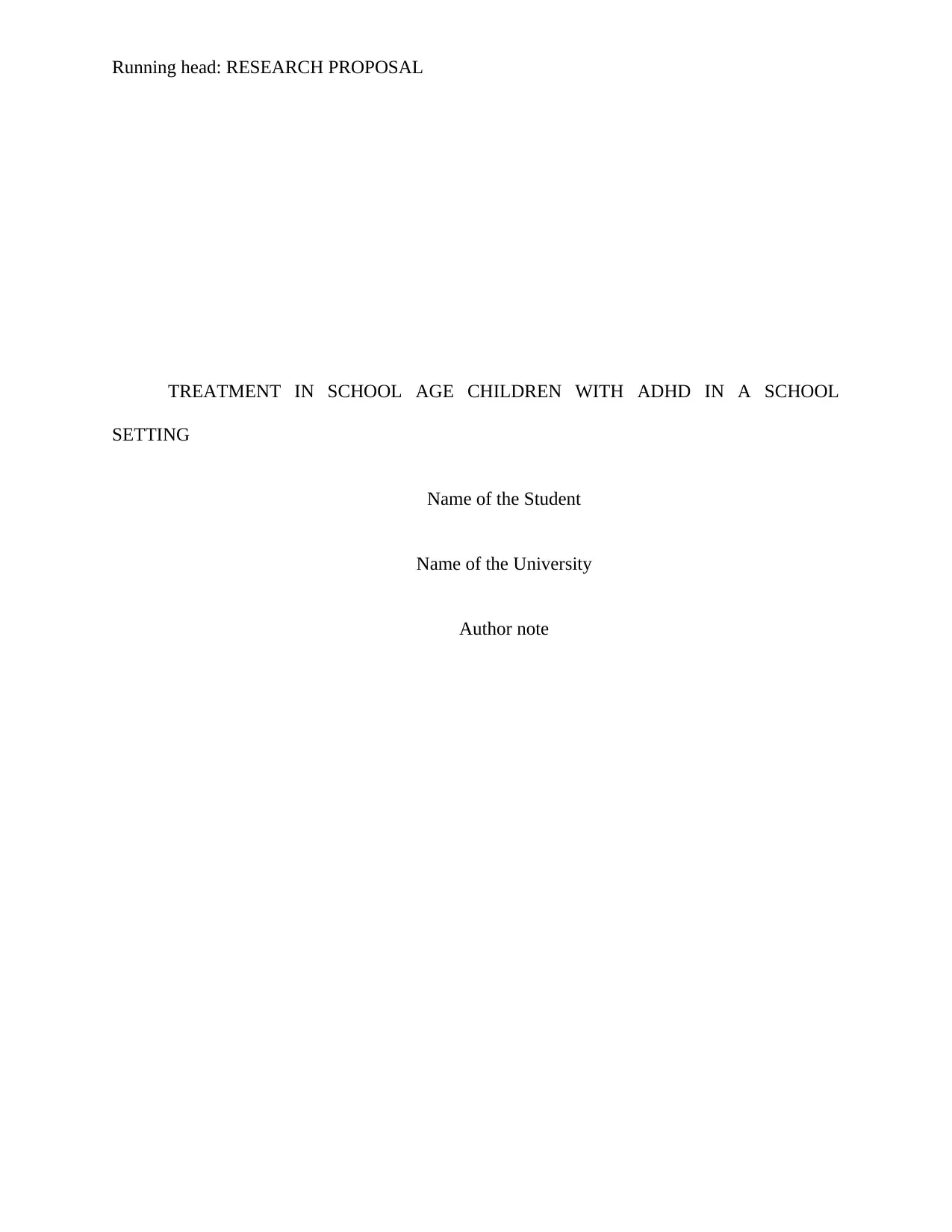
Running head: RESEARCH PROPOSAL
TREATMENT IN SCHOOL AGE CHILDREN WITH ADHD IN A SCHOOL
SETTING
Name of the Student
Name of the University
Author note
TREATMENT IN SCHOOL AGE CHILDREN WITH ADHD IN A SCHOOL
SETTING
Name of the Student
Name of the University
Author note
Paraphrase This Document
Need a fresh take? Get an instant paraphrase of this document with our AI Paraphraser
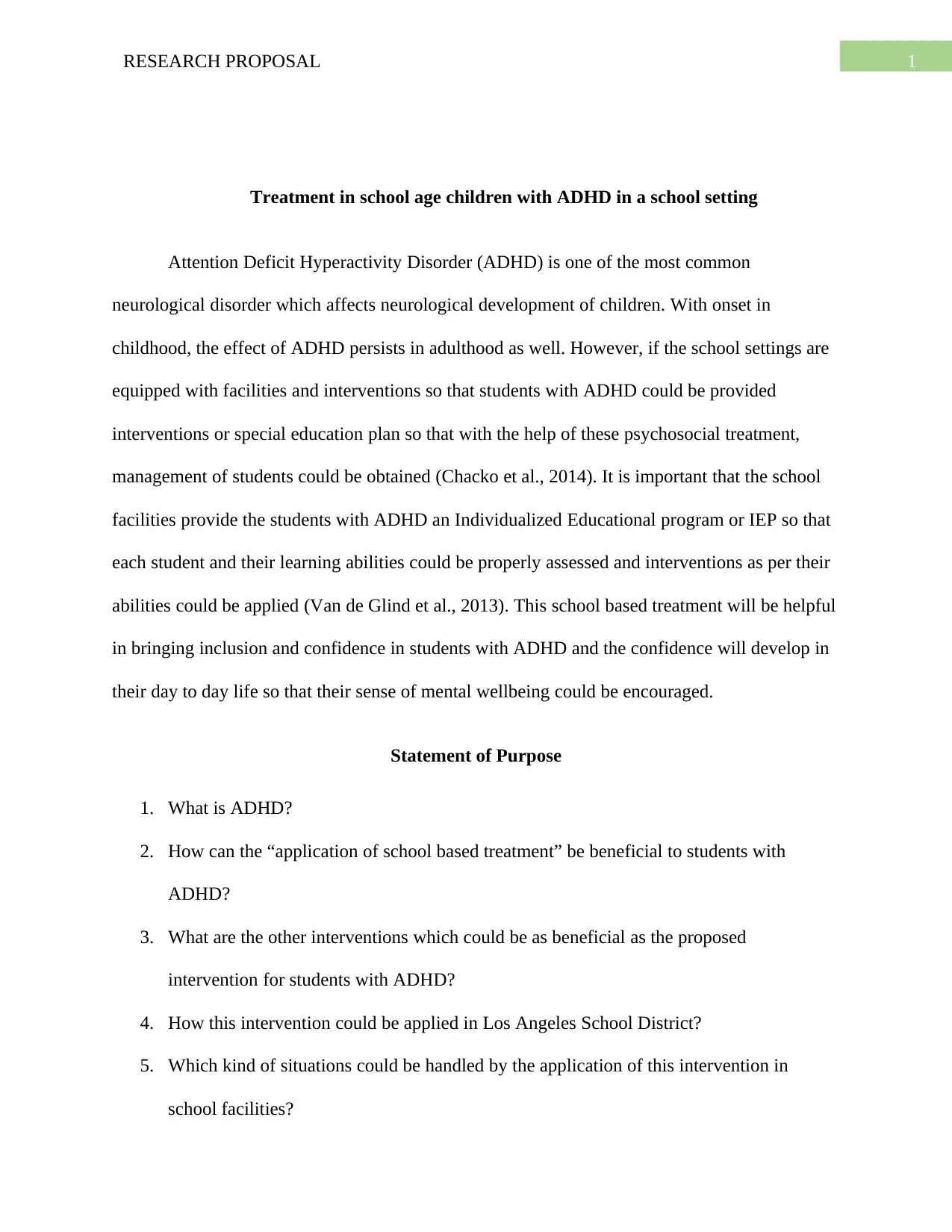
1RESEARCH PROPOSAL
Treatment in school age children with ADHD in a school setting
Attention Deficit Hyperactivity Disorder (ADHD) is one of the most common
neurological disorder which affects neurological development of children. With onset in
childhood, the effect of ADHD persists in adulthood as well. However, if the school settings are
equipped with facilities and interventions so that students with ADHD could be provided
interventions or special education plan so that with the help of these psychosocial treatment,
management of students could be obtained (Chacko et al., 2014). It is important that the school
facilities provide the students with ADHD an Individualized Educational program or IEP so that
each student and their learning abilities could be properly assessed and interventions as per their
abilities could be applied (Van de Glind et al., 2013). This school based treatment will be helpful
in bringing inclusion and confidence in students with ADHD and the confidence will develop in
their day to day life so that their sense of mental wellbeing could be encouraged.
Statement of Purpose
1. What is ADHD?
2. How can the “application of school based treatment” be beneficial to students with
ADHD?
3. What are the other interventions which could be as beneficial as the proposed
intervention for students with ADHD?
4. How this intervention could be applied in Los Angeles School District?
5. Which kind of situations could be handled by the application of this intervention in
school facilities?
Treatment in school age children with ADHD in a school setting
Attention Deficit Hyperactivity Disorder (ADHD) is one of the most common
neurological disorder which affects neurological development of children. With onset in
childhood, the effect of ADHD persists in adulthood as well. However, if the school settings are
equipped with facilities and interventions so that students with ADHD could be provided
interventions or special education plan so that with the help of these psychosocial treatment,
management of students could be obtained (Chacko et al., 2014). It is important that the school
facilities provide the students with ADHD an Individualized Educational program or IEP so that
each student and their learning abilities could be properly assessed and interventions as per their
abilities could be applied (Van de Glind et al., 2013). This school based treatment will be helpful
in bringing inclusion and confidence in students with ADHD and the confidence will develop in
their day to day life so that their sense of mental wellbeing could be encouraged.
Statement of Purpose
1. What is ADHD?
2. How can the “application of school based treatment” be beneficial to students with
ADHD?
3. What are the other interventions which could be as beneficial as the proposed
intervention for students with ADHD?
4. How this intervention could be applied in Los Angeles School District?
5. Which kind of situations could be handled by the application of this intervention in
school facilities?
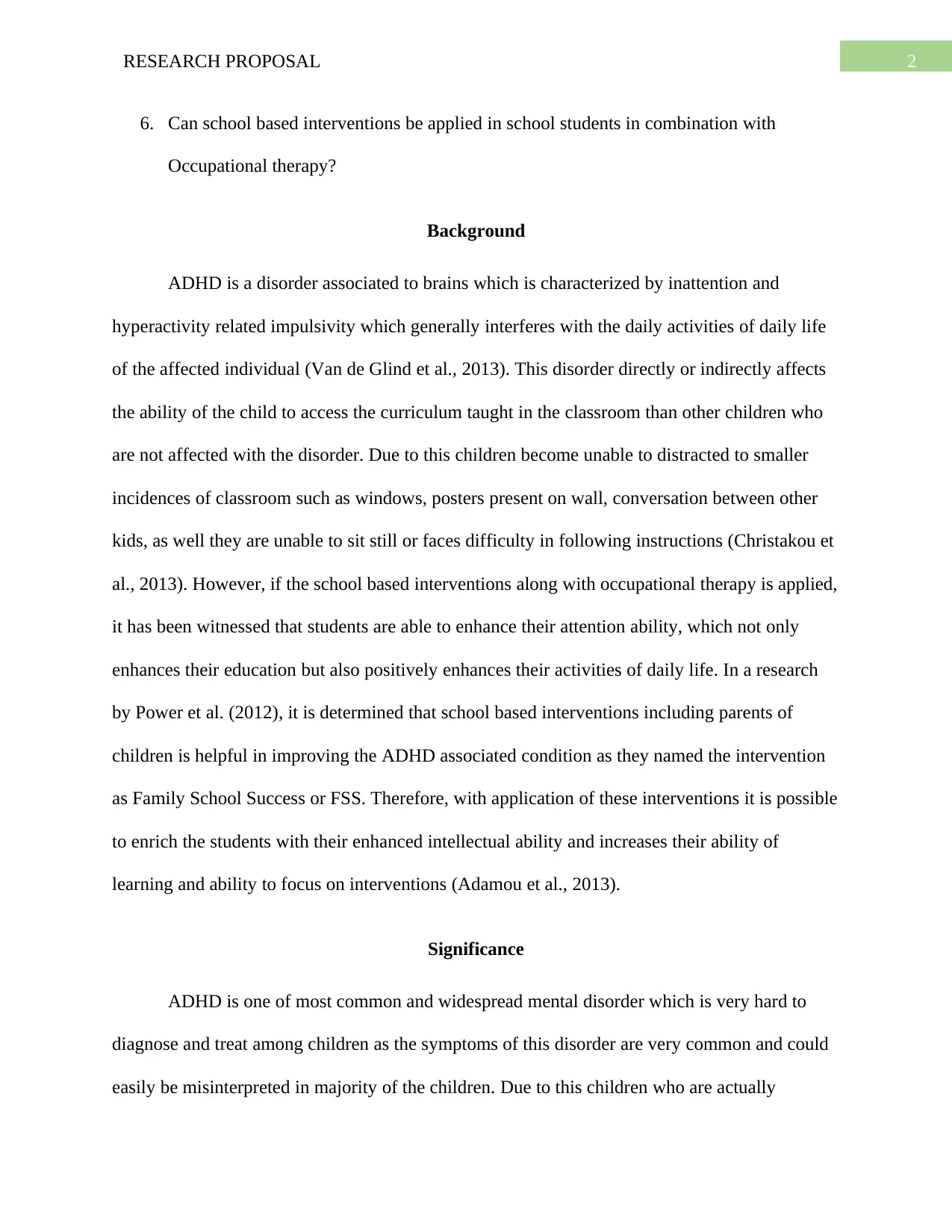
2RESEARCH PROPOSAL
6. Can school based interventions be applied in school students in combination with
Occupational therapy?
Background
ADHD is a disorder associated to brains which is characterized by inattention and
hyperactivity related impulsivity which generally interferes with the daily activities of daily life
of the affected individual (Van de Glind et al., 2013). This disorder directly or indirectly affects
the ability of the child to access the curriculum taught in the classroom than other children who
are not affected with the disorder. Due to this children become unable to distracted to smaller
incidences of classroom such as windows, posters present on wall, conversation between other
kids, as well they are unable to sit still or faces difficulty in following instructions (Christakou et
al., 2013). However, if the school based interventions along with occupational therapy is applied,
it has been witnessed that students are able to enhance their attention ability, which not only
enhances their education but also positively enhances their activities of daily life. In a research
by Power et al. (2012), it is determined that school based interventions including parents of
children is helpful in improving the ADHD associated condition as they named the intervention
as Family School Success or FSS. Therefore, with application of these interventions it is possible
to enrich the students with their enhanced intellectual ability and increases their ability of
learning and ability to focus on interventions (Adamou et al., 2013).
Significance
ADHD is one of most common and widespread mental disorder which is very hard to
diagnose and treat among children as the symptoms of this disorder are very common and could
easily be misinterpreted in majority of the children. Due to this children who are actually
6. Can school based interventions be applied in school students in combination with
Occupational therapy?
Background
ADHD is a disorder associated to brains which is characterized by inattention and
hyperactivity related impulsivity which generally interferes with the daily activities of daily life
of the affected individual (Van de Glind et al., 2013). This disorder directly or indirectly affects
the ability of the child to access the curriculum taught in the classroom than other children who
are not affected with the disorder. Due to this children become unable to distracted to smaller
incidences of classroom such as windows, posters present on wall, conversation between other
kids, as well they are unable to sit still or faces difficulty in following instructions (Christakou et
al., 2013). However, if the school based interventions along with occupational therapy is applied,
it has been witnessed that students are able to enhance their attention ability, which not only
enhances their education but also positively enhances their activities of daily life. In a research
by Power et al. (2012), it is determined that school based interventions including parents of
children is helpful in improving the ADHD associated condition as they named the intervention
as Family School Success or FSS. Therefore, with application of these interventions it is possible
to enrich the students with their enhanced intellectual ability and increases their ability of
learning and ability to focus on interventions (Adamou et al., 2013).
Significance
ADHD is one of most common and widespread mental disorder which is very hard to
diagnose and treat among children as the symptoms of this disorder are very common and could
easily be misinterpreted in majority of the children. Due to this children who are actually
⊘ This is a preview!⊘
Do you want full access?
Subscribe today to unlock all pages.

Trusted by 1+ million students worldwide
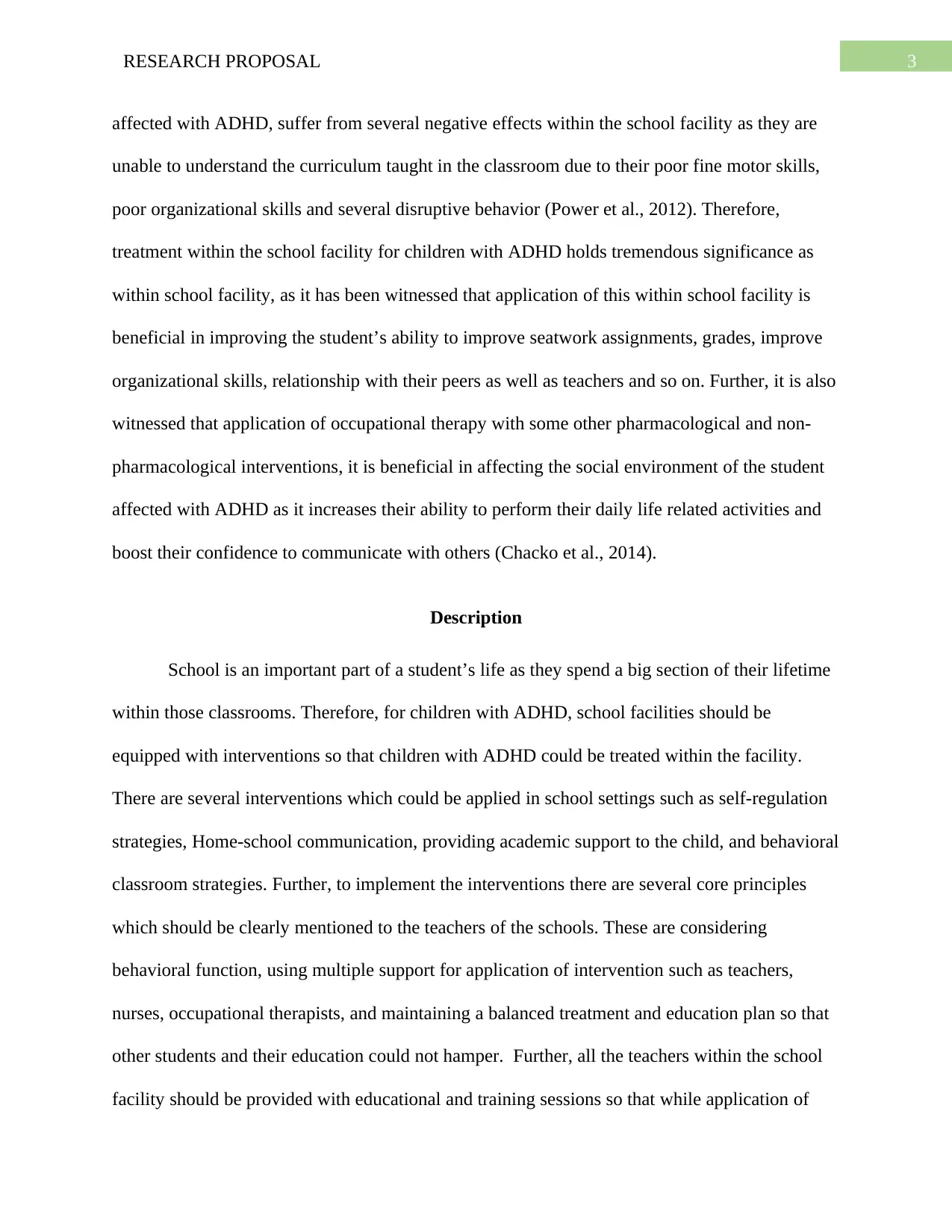
3RESEARCH PROPOSAL
affected with ADHD, suffer from several negative effects within the school facility as they are
unable to understand the curriculum taught in the classroom due to their poor fine motor skills,
poor organizational skills and several disruptive behavior (Power et al., 2012). Therefore,
treatment within the school facility for children with ADHD holds tremendous significance as
within school facility, as it has been witnessed that application of this within school facility is
beneficial in improving the student’s ability to improve seatwork assignments, grades, improve
organizational skills, relationship with their peers as well as teachers and so on. Further, it is also
witnessed that application of occupational therapy with some other pharmacological and non-
pharmacological interventions, it is beneficial in affecting the social environment of the student
affected with ADHD as it increases their ability to perform their daily life related activities and
boost their confidence to communicate with others (Chacko et al., 2014).
Description
School is an important part of a student’s life as they spend a big section of their lifetime
within those classrooms. Therefore, for children with ADHD, school facilities should be
equipped with interventions so that children with ADHD could be treated within the facility.
There are several interventions which could be applied in school settings such as self-regulation
strategies, Home-school communication, providing academic support to the child, and behavioral
classroom strategies. Further, to implement the interventions there are several core principles
which should be clearly mentioned to the teachers of the schools. These are considering
behavioral function, using multiple support for application of intervention such as teachers,
nurses, occupational therapists, and maintaining a balanced treatment and education plan so that
other students and their education could not hamper. Further, all the teachers within the school
facility should be provided with educational and training sessions so that while application of
affected with ADHD, suffer from several negative effects within the school facility as they are
unable to understand the curriculum taught in the classroom due to their poor fine motor skills,
poor organizational skills and several disruptive behavior (Power et al., 2012). Therefore,
treatment within the school facility for children with ADHD holds tremendous significance as
within school facility, as it has been witnessed that application of this within school facility is
beneficial in improving the student’s ability to improve seatwork assignments, grades, improve
organizational skills, relationship with their peers as well as teachers and so on. Further, it is also
witnessed that application of occupational therapy with some other pharmacological and non-
pharmacological interventions, it is beneficial in affecting the social environment of the student
affected with ADHD as it increases their ability to perform their daily life related activities and
boost their confidence to communicate with others (Chacko et al., 2014).
Description
School is an important part of a student’s life as they spend a big section of their lifetime
within those classrooms. Therefore, for children with ADHD, school facilities should be
equipped with interventions so that children with ADHD could be treated within the facility.
There are several interventions which could be applied in school settings such as self-regulation
strategies, Home-school communication, providing academic support to the child, and behavioral
classroom strategies. Further, to implement the interventions there are several core principles
which should be clearly mentioned to the teachers of the schools. These are considering
behavioral function, using multiple support for application of intervention such as teachers,
nurses, occupational therapists, and maintaining a balanced treatment and education plan so that
other students and their education could not hamper. Further, all the teachers within the school
facility should be provided with educational and training sessions so that while application of
Paraphrase This Document
Need a fresh take? Get an instant paraphrase of this document with our AI Paraphraser
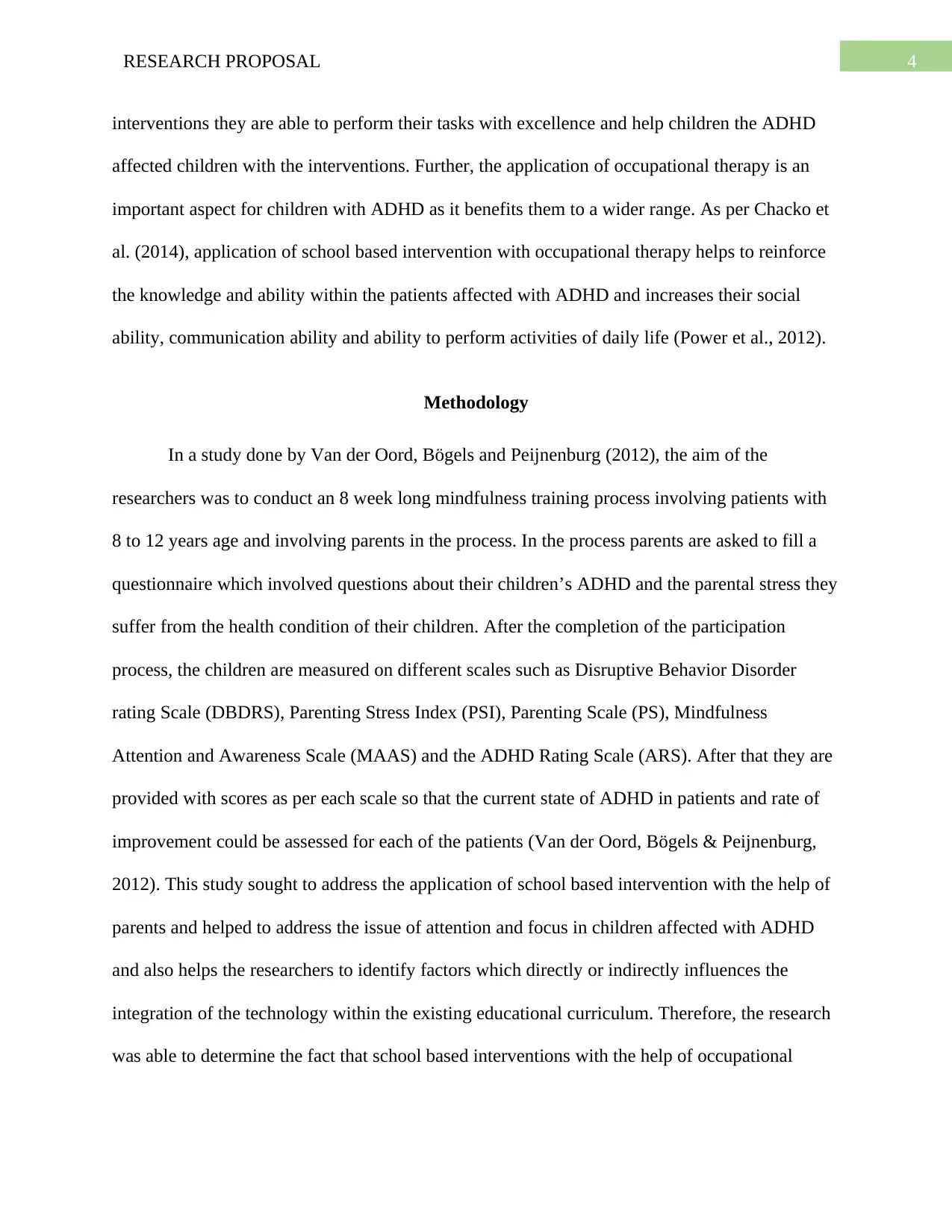
4RESEARCH PROPOSAL
interventions they are able to perform their tasks with excellence and help children the ADHD
affected children with the interventions. Further, the application of occupational therapy is an
important aspect for children with ADHD as it benefits them to a wider range. As per Chacko et
al. (2014), application of school based intervention with occupational therapy helps to reinforce
the knowledge and ability within the patients affected with ADHD and increases their social
ability, communication ability and ability to perform activities of daily life (Power et al., 2012).
Methodology
In a study done by Van der Oord, Bögels and Peijnenburg (2012), the aim of the
researchers was to conduct an 8 week long mindfulness training process involving patients with
8 to 12 years age and involving parents in the process. In the process parents are asked to fill a
questionnaire which involved questions about their children’s ADHD and the parental stress they
suffer from the health condition of their children. After the completion of the participation
process, the children are measured on different scales such as Disruptive Behavior Disorder
rating Scale (DBDRS), Parenting Stress Index (PSI), Parenting Scale (PS), Mindfulness
Attention and Awareness Scale (MAAS) and the ADHD Rating Scale (ARS). After that they are
provided with scores as per each scale so that the current state of ADHD in patients and rate of
improvement could be assessed for each of the patients (Van der Oord, Bögels & Peijnenburg,
2012). This study sought to address the application of school based intervention with the help of
parents and helped to address the issue of attention and focus in children affected with ADHD
and also helps the researchers to identify factors which directly or indirectly influences the
integration of the technology within the existing educational curriculum. Therefore, the research
was able to determine the fact that school based interventions with the help of occupational
interventions they are able to perform their tasks with excellence and help children the ADHD
affected children with the interventions. Further, the application of occupational therapy is an
important aspect for children with ADHD as it benefits them to a wider range. As per Chacko et
al. (2014), application of school based intervention with occupational therapy helps to reinforce
the knowledge and ability within the patients affected with ADHD and increases their social
ability, communication ability and ability to perform activities of daily life (Power et al., 2012).
Methodology
In a study done by Van der Oord, Bögels and Peijnenburg (2012), the aim of the
researchers was to conduct an 8 week long mindfulness training process involving patients with
8 to 12 years age and involving parents in the process. In the process parents are asked to fill a
questionnaire which involved questions about their children’s ADHD and the parental stress they
suffer from the health condition of their children. After the completion of the participation
process, the children are measured on different scales such as Disruptive Behavior Disorder
rating Scale (DBDRS), Parenting Stress Index (PSI), Parenting Scale (PS), Mindfulness
Attention and Awareness Scale (MAAS) and the ADHD Rating Scale (ARS). After that they are
provided with scores as per each scale so that the current state of ADHD in patients and rate of
improvement could be assessed for each of the patients (Van der Oord, Bögels & Peijnenburg,
2012). This study sought to address the application of school based intervention with the help of
parents and helped to address the issue of attention and focus in children affected with ADHD
and also helps the researchers to identify factors which directly or indirectly influences the
integration of the technology within the existing educational curriculum. Therefore, the research
was able to determine the fact that school based interventions with the help of occupational
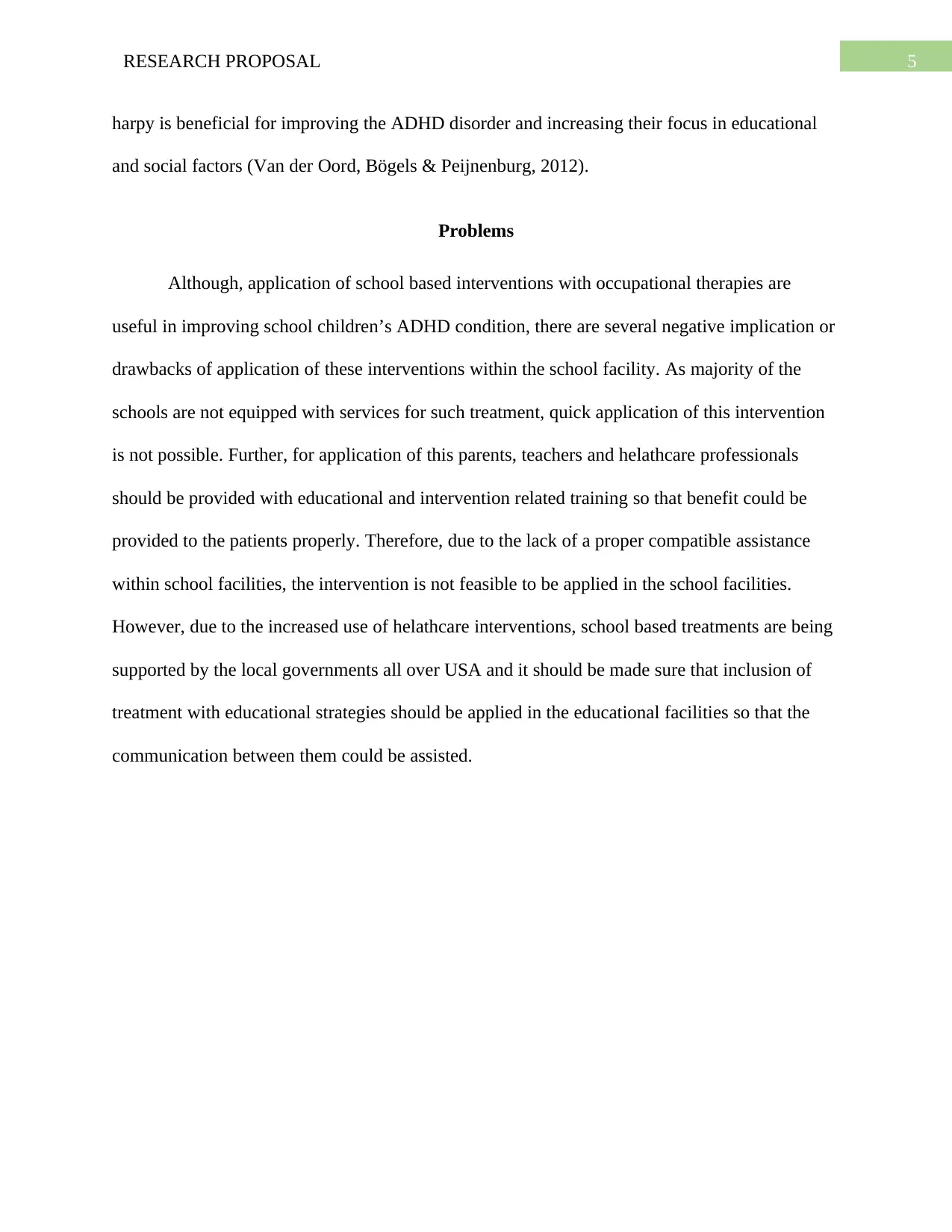
5RESEARCH PROPOSAL
harpy is beneficial for improving the ADHD disorder and increasing their focus in educational
and social factors (Van der Oord, Bögels & Peijnenburg, 2012).
Problems
Although, application of school based interventions with occupational therapies are
useful in improving school children’s ADHD condition, there are several negative implication or
drawbacks of application of these interventions within the school facility. As majority of the
schools are not equipped with services for such treatment, quick application of this intervention
is not possible. Further, for application of this parents, teachers and helathcare professionals
should be provided with educational and intervention related training so that benefit could be
provided to the patients properly. Therefore, due to the lack of a proper compatible assistance
within school facilities, the intervention is not feasible to be applied in the school facilities.
However, due to the increased use of helathcare interventions, school based treatments are being
supported by the local governments all over USA and it should be made sure that inclusion of
treatment with educational strategies should be applied in the educational facilities so that the
communication between them could be assisted.
harpy is beneficial for improving the ADHD disorder and increasing their focus in educational
and social factors (Van der Oord, Bögels & Peijnenburg, 2012).
Problems
Although, application of school based interventions with occupational therapies are
useful in improving school children’s ADHD condition, there are several negative implication or
drawbacks of application of these interventions within the school facility. As majority of the
schools are not equipped with services for such treatment, quick application of this intervention
is not possible. Further, for application of this parents, teachers and helathcare professionals
should be provided with educational and intervention related training so that benefit could be
provided to the patients properly. Therefore, due to the lack of a proper compatible assistance
within school facilities, the intervention is not feasible to be applied in the school facilities.
However, due to the increased use of helathcare interventions, school based treatments are being
supported by the local governments all over USA and it should be made sure that inclusion of
treatment with educational strategies should be applied in the educational facilities so that the
communication between them could be assisted.
⊘ This is a preview!⊘
Do you want full access?
Subscribe today to unlock all pages.

Trusted by 1+ million students worldwide
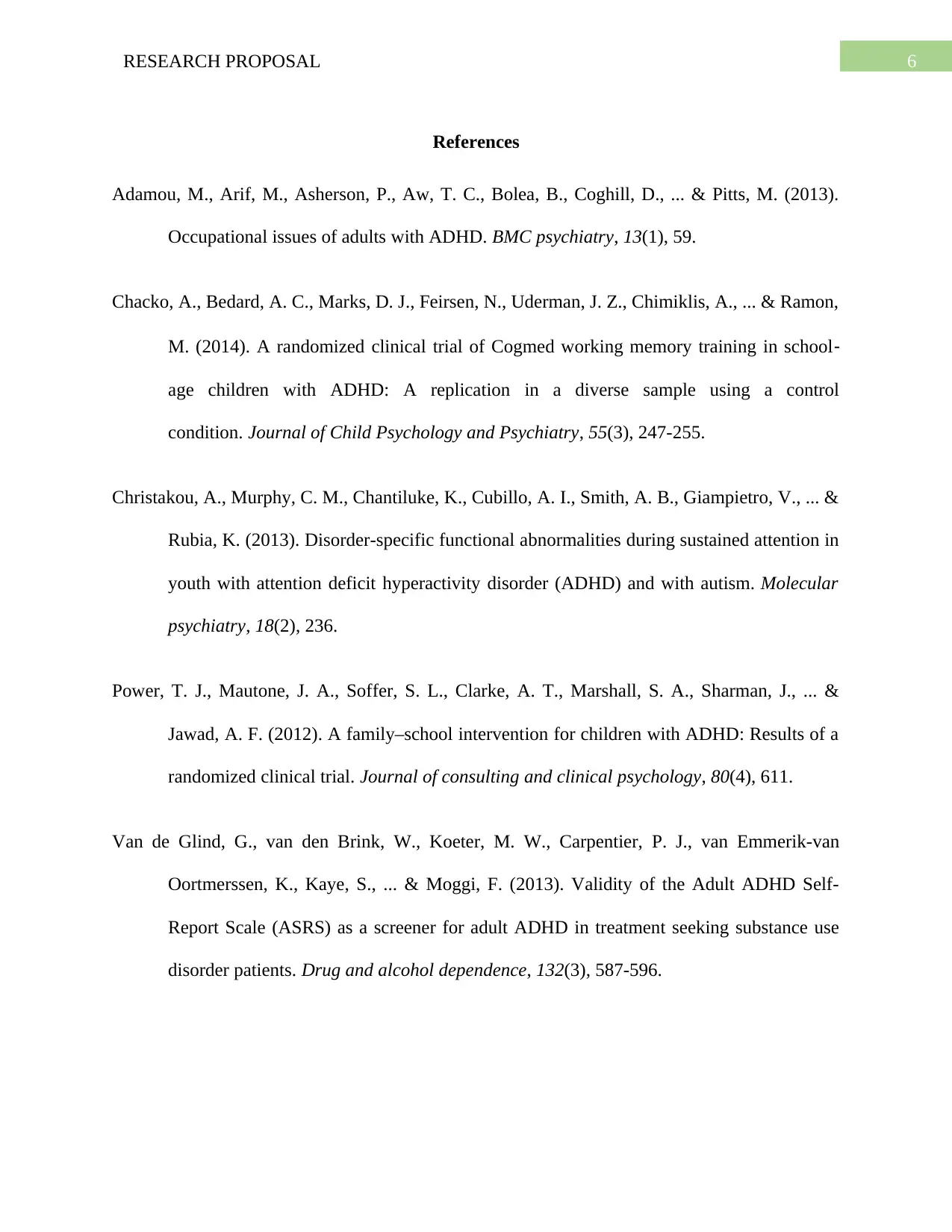
6RESEARCH PROPOSAL
References
Adamou, M., Arif, M., Asherson, P., Aw, T. C., Bolea, B., Coghill, D., ... & Pitts, M. (2013).
Occupational issues of adults with ADHD. BMC psychiatry, 13(1), 59.
Chacko, A., Bedard, A. C., Marks, D. J., Feirsen, N., Uderman, J. Z., Chimiklis, A., ... & Ramon,
M. (2014). A randomized clinical trial of Cogmed working memory training in school‐
age children with ADHD: A replication in a diverse sample using a control
condition. Journal of Child Psychology and Psychiatry, 55(3), 247-255.
Christakou, A., Murphy, C. M., Chantiluke, K., Cubillo, A. I., Smith, A. B., Giampietro, V., ... &
Rubia, K. (2013). Disorder-specific functional abnormalities during sustained attention in
youth with attention deficit hyperactivity disorder (ADHD) and with autism. Molecular
psychiatry, 18(2), 236.
Power, T. J., Mautone, J. A., Soffer, S. L., Clarke, A. T., Marshall, S. A., Sharman, J., ... &
Jawad, A. F. (2012). A family–school intervention for children with ADHD: Results of a
randomized clinical trial. Journal of consulting and clinical psychology, 80(4), 611.
Van de Glind, G., van den Brink, W., Koeter, M. W., Carpentier, P. J., van Emmerik-van
Oortmerssen, K., Kaye, S., ... & Moggi, F. (2013). Validity of the Adult ADHD Self-
Report Scale (ASRS) as a screener for adult ADHD in treatment seeking substance use
disorder patients. Drug and alcohol dependence, 132(3), 587-596.
References
Adamou, M., Arif, M., Asherson, P., Aw, T. C., Bolea, B., Coghill, D., ... & Pitts, M. (2013).
Occupational issues of adults with ADHD. BMC psychiatry, 13(1), 59.
Chacko, A., Bedard, A. C., Marks, D. J., Feirsen, N., Uderman, J. Z., Chimiklis, A., ... & Ramon,
M. (2014). A randomized clinical trial of Cogmed working memory training in school‐
age children with ADHD: A replication in a diverse sample using a control
condition. Journal of Child Psychology and Psychiatry, 55(3), 247-255.
Christakou, A., Murphy, C. M., Chantiluke, K., Cubillo, A. I., Smith, A. B., Giampietro, V., ... &
Rubia, K. (2013). Disorder-specific functional abnormalities during sustained attention in
youth with attention deficit hyperactivity disorder (ADHD) and with autism. Molecular
psychiatry, 18(2), 236.
Power, T. J., Mautone, J. A., Soffer, S. L., Clarke, A. T., Marshall, S. A., Sharman, J., ... &
Jawad, A. F. (2012). A family–school intervention for children with ADHD: Results of a
randomized clinical trial. Journal of consulting and clinical psychology, 80(4), 611.
Van de Glind, G., van den Brink, W., Koeter, M. W., Carpentier, P. J., van Emmerik-van
Oortmerssen, K., Kaye, S., ... & Moggi, F. (2013). Validity of the Adult ADHD Self-
Report Scale (ASRS) as a screener for adult ADHD in treatment seeking substance use
disorder patients. Drug and alcohol dependence, 132(3), 587-596.
Paraphrase This Document
Need a fresh take? Get an instant paraphrase of this document with our AI Paraphraser
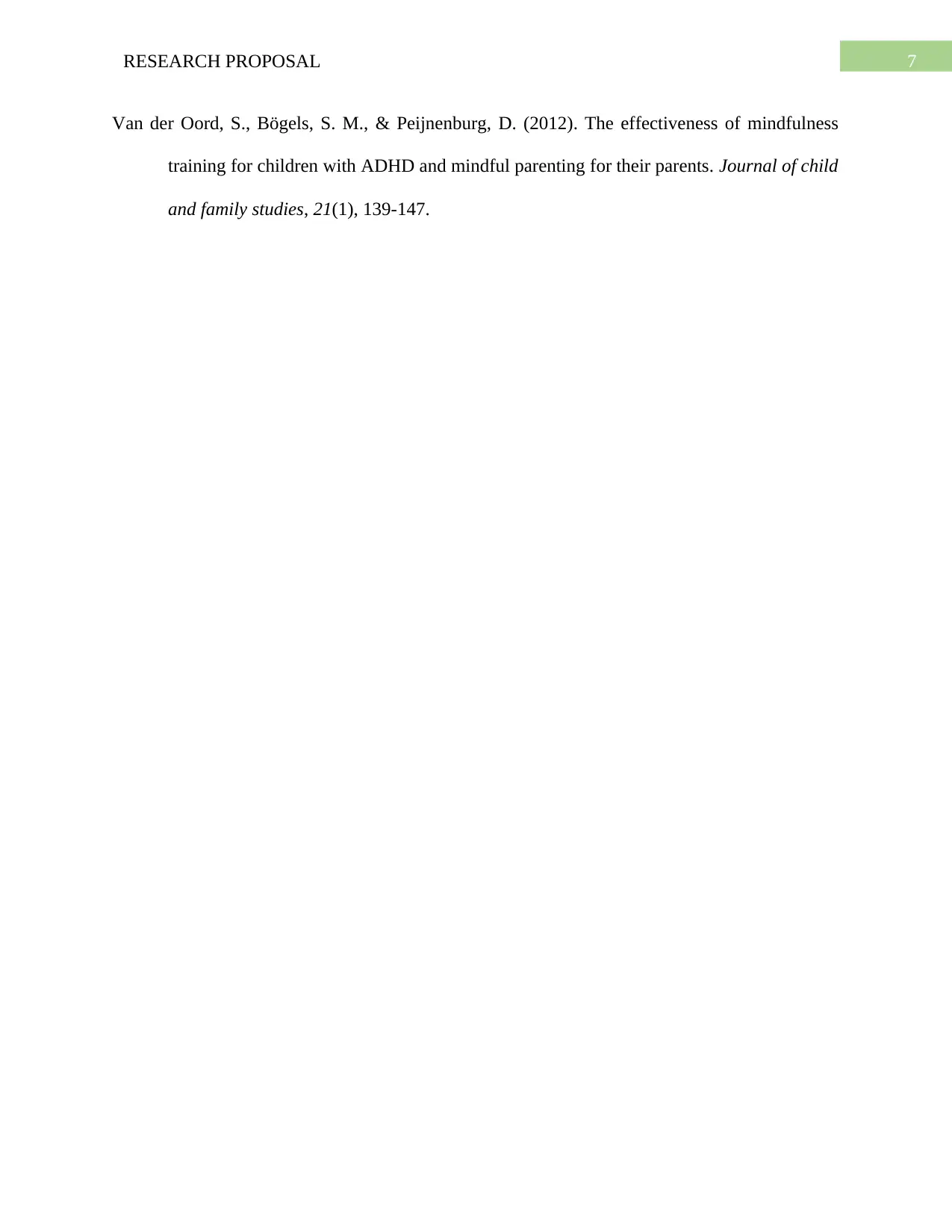
7RESEARCH PROPOSAL
Van der Oord, S., Bögels, S. M., & Peijnenburg, D. (2012). The effectiveness of mindfulness
training for children with ADHD and mindful parenting for their parents. Journal of child
and family studies, 21(1), 139-147.
Van der Oord, S., Bögels, S. M., & Peijnenburg, D. (2012). The effectiveness of mindfulness
training for children with ADHD and mindful parenting for their parents. Journal of child
and family studies, 21(1), 139-147.
1 out of 8
Related Documents
Your All-in-One AI-Powered Toolkit for Academic Success.
+13062052269
info@desklib.com
Available 24*7 on WhatsApp / Email
![[object Object]](/_next/static/media/star-bottom.7253800d.svg)
Unlock your academic potential
Copyright © 2020–2025 A2Z Services. All Rights Reserved. Developed and managed by ZUCOL.





